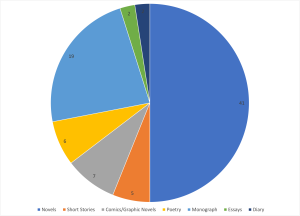Similarly, there are often unexpected plusses to some minor new development. What sugar-packet manufacturer could have known that people would take to flapping the packet back and forth the centrifuge its contents to the bottom, so that they could handily tear off the top? The nakedness of a simple novelty in pre-portioned packaging has been surrounded and softened and made sense of by gesticulative adaptation (possibly inspired by the extinguishing oscillation of a match after the lighting of a cigarette); convenience has given rise to ballet; and the sound of those flapping sugar packets in the early morning, fluttering over from nearby booths, is not one I would willingly forgo, even though I take my coffee unsweetened. Nobody could have predicted that maintenance men would polish escalator handrails standing still, or that students would discover that you can flip pats of pre-portioned butter so they stick to the wall, or that tradesmen would discover that they could conveniently store pencils behind their ears, or later that they would gradually stop storing pencils behind their ears, or that windshield wipers could serve as handy place to leave advertising flyers. And unpretentious technical innovation—the straw, the sugar packet, the windshield wiper— has been ornamented by a mute folklore of behavioral inventions, unregistered, unpatented, adopted and fine-tuned without comment or thought.
I read 105 books in 2012. That is unusual; it’s the first time (at least since I have been keeping track) that I have read more than 100. I am not really sure why or how it happened this year, except that for most of the year reading was how I usually felt like spending my free time. I sort of doubt it will happen again in 2013, but we’ll see.
As is usual for me, fiction dominated my reading. I read 49 novels and six short story collections, but this doesn’t include graphic novels, of which I read 23 (none of which were non-fiction). Most of the latter were trade collections of series comics, in particular the six volumes of The Unwritten that have been published so far. I read 11 children’s books and one Young Adult novel (The Hunger Games— big surprise there).
I’m generally not very good at keeping up with current books, so one of my goals for the year was to read at least 10 books published in 2012; I ended up with 22, including graphic novels (and also counting older books which were published in English for the first time this year).
I also read 10 books that were translated from another language in 2012 (that does not include things like Plato’s Republic, but only more recent books published in a modern language; including stuff from Latin and Ancient Greek would raise that number quite a bit). That’s a number I would like to increase next year.
One big change for me in 2012 was my poetry intake; while I read only 9 collections, in 2011 I read none at all. That is also something I would like to read more of in the coming year; I found I was getting what I wanted from poetry much more consistently than anything else I was reading.
In terms of nonfiction, I read 18 monographs and two collections of essays or criticism. Most of the former was stuff I read for classes I was teaching, and most of it was from the Greeks or the Romans.
Finally, for those interested in the technology of reading, I read only three books on my Kindle in 2012; I actually do use it a lot, but, so far, mostly for articles that I save through Instapaper.
A Few Favorites:
Angelmaker by Nick Harkaway
This was far and away my favorite book of the year, and not because there was no competition. Totally original, beautifully written, and bittersweet, there’s a warmth at the core of this book that stops it from sliding into gimmickry— despite the fact that it involves a doomsday device from WWII, a demonic Central Asian despot and martial arts master, a geriatric secret agent, and a gangster’s son who wants to live a quiet life as a clockwork repairman. If that list does not make you interested, you are never going to like anything I recommend.
The Teleportaion Accident by Ned Beauman
Beauman has a lot in common with Nick Harkaway in terms of some of his themes, in the promiscuous combining of genre tropes and styles, and in the clear sense of pleasure they both get from language. But Beauman’s work so far (like Harkaway, he has written two novels) is more cynical, more satirical— not necessarily a bad thing. The story here follows (though not always very closely) a German set designer from Weimar-era Berlin as he allows lust and sexual frustration to drive him from Berlin to Paris to Los Angeles, in the process avoiding almost altogether the disruptions of WWII— of which he is mostly unaware. Beauman has said that the novel is about teleportation on seven different levels, and I will not try to go into all of that, but it’s funny and weird and quite dark; though imperfect, this shows again that Beauman is going to be somebody worth paying attention to.
The Unwritten by Mike Carey (v. 1-6)
This series was one of my big discoveries for the year; I had not heard of it until the fifth collection was published back in January, and the descriptions I read of that prompted me to go back to the beginning. I read the first five volumes in one big gulp, more or less, and waited anxiously for the sixth, which came out later in the year. It’s the first comic series ever, for me, that rivals Sandman in the quality of the writing and the richness of the world in which it takes place; like Sandman, it is about the things that go on behind the world we know, things of which we are only peripherally aware. it doesn’t quite have the poetry or mythic scope of Gaiman’s series, but the flip side of that is that the characters at the center of the story really are characters, instead of, well, gods, or whatever. I felt like it fell off a bit in the most recent volume, but that might just be because I don’t like having everything get explained (something that never happened in the Sandman books), but even with that it’s a great series and I will still be picking up the next collection as soon as it is available.
The Extraordinary Education of Nicholas Benedict by Trenton Lee Stewart
This is a prequel to the Mysterious Benedict Society series, and tells the story of Nicholas Benedict, the narcoleptic genius who drafts the children in those books to combat his equally brilliant brother. It’s a children’s series, aimed at 4-6th grade readers, but this is still one of the best things I read all year. These are exactly the kind of book I loved as a kid, and also the kind I want every kid I know to read and love. It’s about self-reliance and using what you’ve got to better your situation, but it’s also about not losing faith in other people in the process; that second part gets lost, sometimes, as we move from one part of our lives to the next. The writing is crisp and evocative, and Nicholas himself is a really remarkable character: smarter than everybody else, but also having an extraordinary level of empathy and insight into the people around him. That means he doesn’t just outgun everybody, so to speak, with his brains, but engages with them in a very intelligent way— even when they are enemies, or at least obstacles.
The Mezzanine by Nicholson Baker
Prior to this, the only thing I had read by Nicholson baker was The Anthologist, which is, clearly, quite different from his earlier work. I read something somewhere a couple of months ago in which the author drew a comparison between Baker and David Foster Wallace— one of my favorite authors, and someone who, in my ignorance, I would never have connected to Baker. That prompted me to take a look at his first novel, and it turned out to be exactly my kind of book. First of all, I like footnotes in fiction. Some people see them as a gimmick, but at this point I think we’ve gotten past the point where they seem novel. To me, they are just honest: building a narrative involves making choices that exclude other possibilities, and footnotes allow the author to maintain those other possibilities for a little longer. I also like writers from whom one gets the sense that their biggest challenge is containment— that they have more to say than they can ever get to, that they are fascinated by the world and all of its nooks and crannies, and want to do everything all at once. Obviously, it’s a problem if they fail to contain themselves, if they can’t bring their material under control and give it some kind of narrative sense, but footnotes, done right, allow writers of this kind to balance the urge to maximalism with the need for containment. Anyway, this is a book about going to work in an office. That’s kind of it. But it achieves a kind of fractal expansion of the mundane which reveals not just complication but beauty. For example: when discussing the advent of the plastic straw and the problems (floating) that came with it, Baker’s narrator says:
If the phrase “mute folklore of behavioral inventions” used in reference to people shaking sugar packets does not make you want to read this, well, then, again, you are not going to like anything I suggest to you. Did I mention that this entire quotation is from a footnote?
Guadalajara by Quim Monzó
I picked this up at the library based, more or less, on the cover; I took it home based on the jacket copy. That is not a reliable way of finding good books, but in this case it led to the discovery of a writer whose work I immediately wanted to consume in its entirety. Many of these short stories are more like concept sketches; most of them could begin with “What if…” But the ideas that follow that ellipsis are almost always fascinating. In one story, a cockroach wakes up to find that he has been transformed into an adolescent human male; in another, Robin Hood robs from the rich and gives to the poor until the poor are the rich and the rich are the poor— at which point he starts the process over. Monzó is relentlessly inventive, but also has the restraint to avoid taking these ideas past their useful life. I don’t yet know how well he sustains what he does for the length of a novel, but what I’ve read so far makes me want to find out.
Satantango by László Krasznahorkai
This book got a lot of (a certain kind of) press this year, in art because it took so long for a translation to appear; the book was first published in Hungarian in 1985, but was not translated until this year. It’s also got a sort of notoriety due to the fact that Bela Tarr made a seven-hour movie out of it. I haven’t seen the film, and frankly don’t know if i ever will, but the book is fascinating. It’s about the last few inhabitants of a small village, waiting for the rain to stop so that they can abandon the place; before they can leave, a pair of dubious characters return from (as the villagers believed) the dead, and offer either hope and a plan to improve their situation, or a scam to milk them of their last resources. James Wood mentioned Thomas Bernhard in his review of the book, and Bernhard has a lot in common with Krasznahorkai stylistically, with long, unbroken sentences that stretch for pages and resist all attempts to parse them. Krasznahorkai, though, has much more of a sense of humor, and a bleak as things in this book are there remains a sense that they are also ridiculous.
The Complete List 2012:
1) S. James Anaya: Indigenous Peoples in International Law
2) Saul Bellow: The Adventures of Augie March
3) John Kennedy Toole: A Confederacy of Dunces
4) Paul Cornell and Jimmy Broxton: Batman: Knight and Squire
5) Grant Morrison and Frank Quitely: WE3
6) Alain de Botton: The Pleasures and Sorrows of Work
7) Brian Selznick: The Invention of Hugo Cabret
8) Mike Carey: Tommy Taylor and the Bogus Identity (The Unwritten Vol. 1)
9) Cesar Aira: How I Became a Nun
10) Mona Lee Krook: Quotas for Women in Politics
11) Mike Carey: Inside Man (The Unwritten Vol. 2)
12) Mike Carey: Dead Man’s Knock (The Unwritten Vol. 3)
13) Phillip Smith (ed): 100 Best-Loved Poems
14) David Levithan: The Lover’s Dictionary
15) Jill Norgren: The Cherokee Cases (re-read)
16) Mike Carey: Leviathan (The Unwritten Vol. 4)
17) Meghan O’Rourke: Halflife
18) Mike Carey: On to Genesis (The Unwritten Vol.5) [2012]
19) Patti Smith: Just Kids
20) Sara Levine: Treasure Island!!!
21) Mario Vargas Llosa: Conversation in the Cathedral
22) Jeff Kinney: Diary of a Wimpy Kid
23) Caroline Preston: The Scrapbook of Frankie Pratt
24) Christopher Priest: Inverted World
25) Stefan Zweig: Journey into the Past
26) Kate Cleminson: Otto the Book Bear
27) Iris Marion Young: Inclusion and Democracy
28) Rivka Galchen: Atmospheric Disturbances
29) Katherine A.R. Opello: Gender Quotas, Parity Reform, and Political Parties in France
30) Michael Dirda: On Conan Doyle
31) Ashley Spires: Binky to the Rescue
32) Ashley Spires: Binky Under Pressure
33) Ben Aaronovitch: Moon Over Soho (kindle)
34) Richard Benson: F in Exams
35) Melanie Benjamin: Alice I Have Been
36) Meghan O’Rourke: Once
37) Craig Thompson: Habibi
38) Michael Crichton: Micro
39) A. Lee Martinez: Emperor Mollusk Versus the Sinister Brain [2012]
40) Nick Harkaway: Angelmaker
41) American Poetry and Literacy Project (ed): 101 Great American Poems
42) Suzanne Collins: The Hunger Games
43) Amy Waldman: The Submission
44) Krys Lee: Drifting House
45) Pseudonymous Bosch: The Name of This Book is Secret
46) Isaac Azimov: Second Foundation
47) Gary Shteyngart: Super Sad True Love Story
48) Isaac Asimov: Foundation’s Edge
49) Audrey Niffenegger: The Night Bookmobile
50) Neil Gaiman and Dave McKean: Black Orchid
51) Hari Knuzru: Gods Without Men
52) Forrest Gander: Core Samples from the World
53) Terry Brooks: Wizard at Large
54) Bill Wallingham: Legends in Exile
55) Agatha Christie: Three Blind Mice and Other Stories
56) Bill Wallingham: Animal Farm (Fables #2)
57) Stuart Gibbs: Spy School
58) Graham Moore: The Sherlockian
59) Alain de Botton: The Architecture of Happiness
60) Trenton Lee Stewart: The Extraordinary Education of Nicholas Benedict
61) Cesar Aira: Varamo
62) Lissa Evans: Horten’s Miraculous Mechanisms
63) Arthur Conan Doyle: The Adventures of Gerard
64) Ned Beauman: The Teleportation Accident
65) Jesmyn Ward: Salvage the Bones
66) Nick Harkaway: The Gone-Away World
67) Jeph Loeb: Batman: Haunted Knight
68) Laszlo Krasznahorkai: Satantango
69) Thucydides: History of the Peloponnesian War (re-read)
70) Adam Levin: Hot Pink
71) Aristophanes: Lysistrata
72) Dave Eggers: A Hologram for the King
73) Eric Ambler: Cause for Alarm
74) Plato: The Republic (Robin Waterfield translation) (re-read, though not this translation)
75) Paolo Giordano: The Solitude of Prime Numbers
76) Paul Cartledge: Ancient Greece: A History in Eleven Cities
77) C.S. Lewis: Out of the Silent Planet
78) Aristotle: Politics (re-read)
79) Nick Hornby: More Baths, Less Talking
80) Sharon Olds: Stag’s Leap
81) Polybius: The Rise of the Roman Empire
82) Maurice Dekobra: Madonna of the Sleeping Cars
83) Cicero: The Republic and the Laws
84) Mike Carey: Tommy Taylor and the War of Words (The Unwritten #6)
85) Joanna Klink: Raptus
86) Eowyn Ivey: The Snow Child
87) Quim Monzo: Guadalajara
88) Richard Thompson: Shapes and Colors: A Cul de Sac Collection
89) Thomas Aquinas: Commentary on the Politics of Aristotle
90) Cesar Aira: The Miracle Cures of Dr. Aira
91) Juan Pablo Villalobos: Down the Rabbit Hole
92) Nicholas Blake: The Smiler with the Knife
93) Ernest Hemingway: The Snows of Kilimanjaro
94) Nicholson Baker: The Mezzanine
95) Muriel Spark: The Ballad of Peckham Rye
96) Brian K. Vaughan and Fiona Staples: Saga (vol. 1)
97) Muriel Spark: Girls of Slender Means
98) Mary Oliver: A Thousand Mornings
99) Stephen Greenblatt: The Swerve: How the World Became Modern
100) Jorie Graham: Place
101) Daniel Mendelsohn: How Beautiful It Is and How Easily It Can Be Broken
102) Jason: Athos in America
103) Kevin Huizenga: Gloriana
104) Eric Berlin: The Puzzling World of Winston Breen
105: Ted Kooser and Jon Klassen: House Held up by Trees


